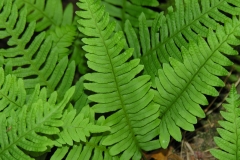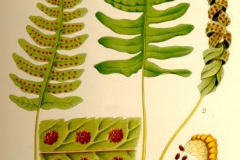| Polypody Quick Facts | |
|---|---|
| Name: | Polypody |
| Scientific Name: | Polypodium vulgare |
| Name | Polypody |
|---|---|
| Scientific Name | Polypodium vulgare |
| Common/English Name | Rock Polypod, Common Polypody, Brake Root, Fern Root, Polypody, Golden Maidenhair Fern, Adders Fern, Wall Fern, Common Polypod Fern |
| Name in Other Languages | Danish: Almindelig engelsø; German: Gemeiner Tüpfelfarn, Gewöhnlicher Tüpfelfarn; English: Adder’s fern, Common polypody, Golden-maidenhair, Polypody, Wall fern; Dutch: Gewone eikvaren; Swedish: Pohjankallioimarre; Arabic: Azrasul kalb, Kasirul arjil, Saquibal Hajer, Tashmeez, Barzia; Urdu: Bisfaij; Hindi: Bisfaija, Khankali, Kala bichwa; Persian: Bispaik; Latin: Bazbodia |
| Plant Growth Habit | Perennial, small fern |
| Plant Size | 30 cm high |
| Rhizome | Flattened, yellowish-brown |
| Leaf | Evergreen, oblong, 8–40 cm (3.1–15.7 in) long and 3–6 cm (1.2–2.4 in) wide |
| Medicinal parts | Root and tops |
Health Benefits of Polypody
- Respiratory health
Polypody has expectorant properties, it is useful or treating various respiratory ailments. It is drunk in form of tea to treat catarrh, coughs, congestion and bronchitis.
- Digestive health
It promotes digestive health and provides gastrointestinal complaints. It stimulates bile production and used for treating conditions and boost appetite. It acts as gentle and laxative and safe and natural treatment for constipation.
- Fever
It lowers fevers due to antipyretic properties.
- Rheumatism and pain relief
Polypody has analgesic properties which helps to provide relief from pain and used as an aid for rheumatism and arthritis. The study conducted on rats was provided given extracts of the herb that provides relief from pain through improved reaction times.
- Skin health
Apply polypody topically for treating minor wounds, grazes, cuts, scrapes and bites. The antibacterial properties found in the plant helps to prevent infection from taking hold and also lower inflammation and irritation and also speeds up healing of wounds. Topically apply it for dealing with common inflammatory skin conditions such as eczema and psoriasis.
Uses
The starchy root stocks were boiled and eaten by the Indians, and they knew of their effect as a worm medicine. Our pioneers soaked them in water and wood ashes for 24 hr. and cooked the young leaves like pot herbs.
The many species of ferns were also used in decoction as a cure for rickets in children. The strong decoction is purgative. A specific in expelling tape worms, by influencing their muscle release. The presence of warms causes serious anaemia, undermining various organs of the body. The syrup as a decoction has been found very valuable in pulmonary and hepatic diseases.
The ancients used the roots and the whole plant in decoctions and diet drinks for the spleen and other disorders. The Japanese use it in soup. Combined with liverwort it is said to have restored patients severely affected with disease of the lungs. Do not use extensively.
Dose
1–4 drams of the powdered plant, 4 fl. oz. of the syrup decoction, three or four times a day.
Traditional uses
- It stimulates secretion of bile and acts as a gentle laxative.
- It is used in European herbal medicine for treating hepatitis and jaundice and used as an aid for indigestion and loss of appetite.
- Root tea is used for treating pleurisy, sore throats, hives and stomach aches.
- It is used for lung ailments and liver problems.
Side effects
- It should not be used externally as it can cause skin rashes.
- Excessive use of Polypody results to various side effects such as vomiting, nausea and stomach pain.
- Sensitive people might experience minor rash with its application.
Other facts
Rhizome has bittersweet flavor and used to make confectionery like nougat.
References:
https://www.itis.gov/servlet/SingleRpt/SingleRpt?search_topic=TSN&search_value=17242#null
https://pfaf.org/user/plant.aspx?latinname=Polypodium+vulgare
https://en.wikipedia.org/wiki/Polypodium_vulgare
https://practicalplants.org/wiki/Polypodium_vulgare
https://elmaskincare.com/herbs/herbs_polypody.htm
https://healthyfocus.org/health-benefits-of-polypodium-vulgare/





